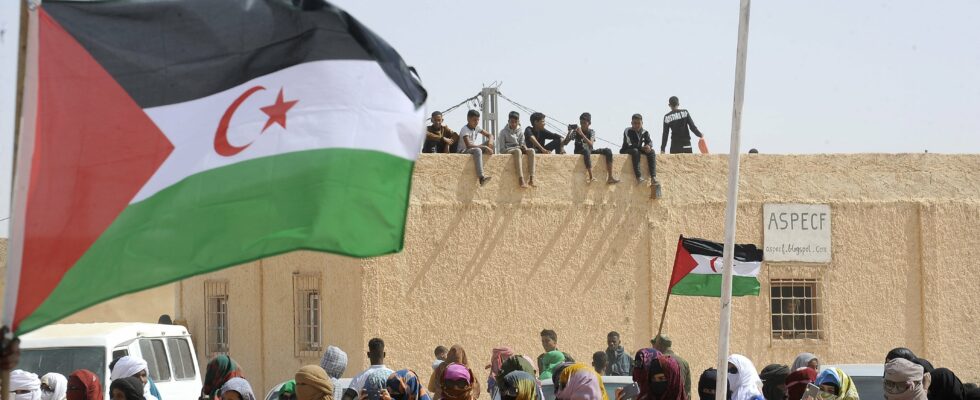This is a decision that risks having significant consequences for the future of French foreign policy in the Maghreb and West Africa. In stating his support for the Moroccan plan for Western Sahara, Emmanuel Macron could not ignore it: the decision would immediately cause shock on the part of Algeria, a historical supporter of the Polisario Front and with frosty relations with Morocco. This was not missed: Algiers immediately announced the “withdrawal with immediate effect” of its ambassador to France, and announced other measures. The head of Algerian diplomacy denounced a decision that “defends the legitimacy of the colonial order” and “does not serve the peaceful settlement of the question of Western Sahara”.
In the Algerian press, where freedom of expression is largely restricted, the various articles and posts since Tuesday bear witness to the great animosity towards this French decision. The state newspaper Horizons reflects this vision at the top of the Algerian state, explaining that “it is now up to the French Republic to assume its historical responsibility and its responsibility before humanity. By supporting colonial action, France has not only flouted international law, but above all failed in its mission within the Security Council.”
But even on the side of the more independent press, seriously criticized by the government, the discourse is also quite critical. “France aligns itself with Morocco’s colonialist theses”, is the headline of the newspaper. El Watanone of the main Algerian dailies. TSA (Tout sur l’Algérie), an independent online newspaper, blocked several times during major demonstrations such as in 2019, headlined on its side on the “beginnings of a new diplomatic quarrel” between the two countries. Describing this decision as “predictable”, particularly in view of the recent statements by the head of French diplomacy Stéphane Séjourné opening this path, the timing and the form question TSA. “By choosing to communicate its decision through diplomatic channels, without media hype, in a context of geopolitical upheavals, as evidenced by the impotence of the UN in the face of the situation in Gaza, where the eyes of the whole world are fixed on the 2024 Olympic Games, Paris clearly intends to present Algiers with a fait accompli. Which perhaps explains the ‘surprise’ of Algeria which describes the decision as ‘unexpected'”.
“Macron is trapping Algerian-French relations”
The Algerian press is particularly wondering about the causes that led to this great step forward taken by Paris. El Watan, between France and Morocco, “the trend is towards reconciliation and remodeled strategic or tactical issues, not sufficiently clear at the moment. Enough to push the French president to explicitly satisfy Morocco’s pressing expectations on the question of Western Sahara.”
“Macron traps Algerian-French relations”, is the headline of the daily newspaper El Khabar. For the Arabic newspaper, one of the most widely read in the country, this demonstrates “a French desire to promote its interests in Morocco, to obtain a share of the spoils of the desert lands and thus compensate for the losses suffered in the Sahel and West Africa. But also to seek to restore the role that Paris has long played in favor of the monarchy, that is to say the exercise of guardianship and protection on the horizon of the transition of power to the crown prince of his tired father.” For Emmanuel Macron, this assumed calculation would imply the fact of “freezing bilateral relations between the two until the end of his mandate (more than three years)”, they estimate, affirming that it was now not impossible that “all the projects launched between the two countries during his first mandate collapse, including memorial projects.”
“Love of settling scores with Algeria”
But some go even further. Echoroukthe best-selling daily in Algeria, does not hesitate to associate this decision with the long post-colonial history between the two countries. “France, it is said, has forgotten all its grudges with all the countries against which it has had wars, quarrels and disputes. It has forgotten the Hundred Years’ War with England, it has forgotten its war with Germany. It would be ready to forget its wars with the devil if he made war on it. But it is not about to forget its humiliating defeat in Algeria. Even today, and perhaps forever, France feels the bitterness of this defeat, which it has not been able to digest,” it lashes out.
Still according to the newspaper Echoroukthis decision to support the Moroccan project in Western Sahara would therefore be mainly motivated by one reason: to make Algeria pay. “In 1975, when Morocco mobilized in favor of the invasion of Western Sahara, France was faced with two choices. The first was the logically correct path; namely that France, by virtue of its colonial past in Northwest Africa, its strong relations with the countries of the region and its presence on the UN Security Council, and in order to create new relations in the region, had to defend international law. The second path, tortuous and extralegal, consisted of recognizing the Madrid Agreement for the partition of Western Sahara, with the aim of taking revenge on Algeria. Between choosing the first path, correct and legal, and the second path paved with grudges, miscalculations, narrow-mindedness, greed and love of settling scores with Algeria, France chose, blindfolded, to follow the second path.”
For the more moderate TSA newspaper, this decision was simply the simplest solution to improve relations with Morocco, which had deteriorated significantly in recent years. “Nothing better for Paris to regain the trust of a country that has criticized it for its Algerian tropism since President Emmanuel Macron came to power in 2017 than to assure it of its support in its approach to the Sahrawi question. This shows the pressure exerted in Paris over the past few months, supported by a pro-Moroccan lobby powerful enough to tip the relationship in favor of Rabat and to the detriment of Algiers.” One thing is certain: relations between France and Algeria are unlikely to improve in the near future.
